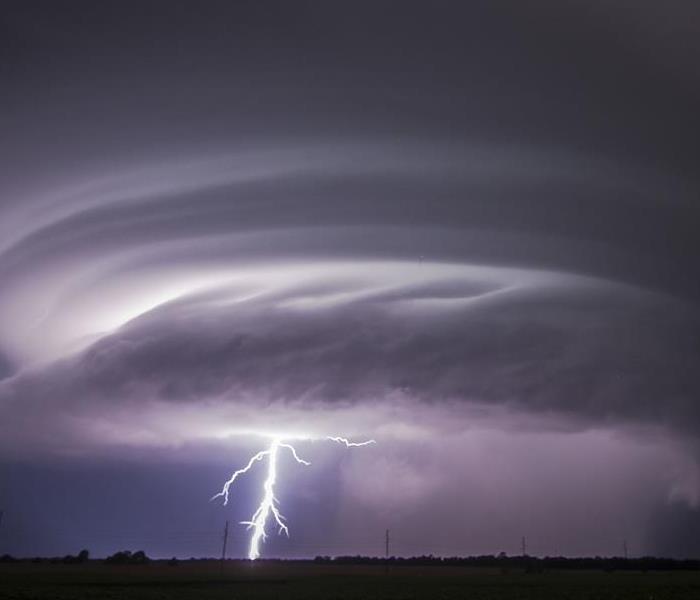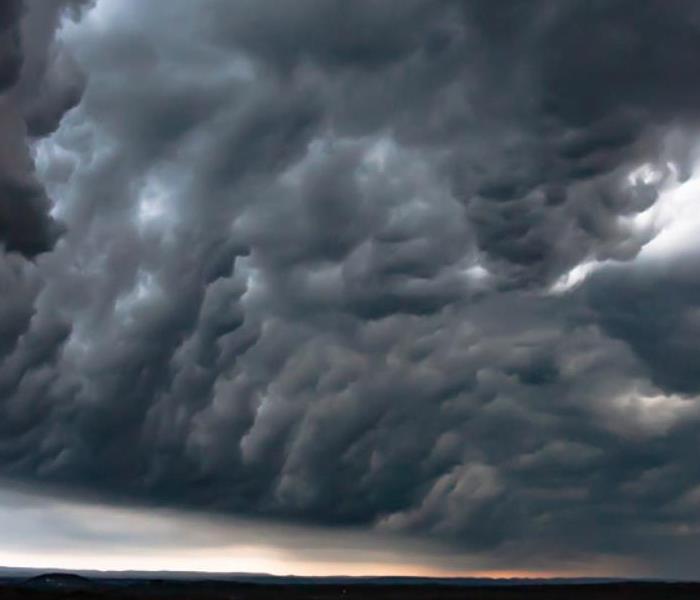Archived Storm Damage Blog Posts
Tips on Protecting Your Piped from Freezing Up
3/15/2023 (Permalink)
As autumn descends into winter, temperatures really begin to plummet, and storms become more frequent. Before it gets too cold to take precautions, now is the time to prepare. SERVPRO of Atascadero/ Paso Robles has a few tips to prevent your pipes from freezing—these important tips can help you prevent water damage from harming your home or business.
How to Protect Pipes from Freezing
- Drain water from swimming pool and water sprinkler supply lines.
- Drain and bring all your outdoor hoses to inside storage (garage, shed, etc.).
- Close all valves that supply outdoor hose bibs.
- Insulate your attics, basements, and crawl spaces. Insulation will keep these areas warmer.
- Sometimes water supply lines are in unheated areas. Check garages and under kitchen and bathroom cabinets. All pipes in these areas should be insulated/wrapped.
- Consider installing pipe sleeves or installing heat tape on exposed water pipes. Even something as simple as newspaper can provide some protection to exposed pipes, at just ¼” thickness.
- Consider relocating exposed pipes to provide increased protection from freezing.
How to Prevent Frozen Pipes
- If there are any water supply lines in the garage, keep garage doors closed.
- To allow warmer air to circulate around the plumbing, open kitchen, and bathroom cabinet doors.
- When it’s EXTREMELY cold outside, let water drip from the faucet served by exposed pipes. Running even the smallest trickle of water helps prevent pipes from freezing.
- Set thermostat to the same temperature 24/7. You might end up with a higher heating bill, but by temporarily ceasing lower nighttime temperatures, you could prevent a much more expensive repair job if pipes freeze and burst.
Knowing The Effects of Water Damage to a Home After A Storm
3/15/2023 (Permalink)
Water damage is a problem that most homeowners fear, but the reality can be worse than most people imagine, if it is not dealt with quickly. If left alone or unnoticed, the effects of water damage can be horrific and can leave people’s homes in shambles. Here are a few of the effects of water damage on a home if left alone for too long.
Ruin the Structure of the Home
One of the largest and worst effects of having water damage in a home is that it can ruin the structure of a home. Water seeping into the walls, floors and ceiling in a house can weaken the integrity and make it more prone to sagging, tearing, or even collapsing. The best way to ensure this never happens is to not only get the water damage looked after quick, but also to have it looked at by a professional.
A Lengthy Restoration Process
If a home has been severely damaged by water, it will prevent people from living there due to the damage and condition that everything is in. Also, if the damage was long enough (and restoration will take a while), it could keep people from their home for even days or weeks. Therefore a professional should be contacted ASAP, to ensure that the mess can be cleaned up quickly, as the longer the water sits and the more damage that is done, the longer the restoration will take.
SERVPRO of Atascadero/ Paso Robles Fast Response During Storm Events
3/13/2023 (Permalink)
SERVPRO of Atascadero/Paso Robles specializes in storm and flood damage restoration throughout the north part of the Central Coast. Our technicians are highly trained, and they use specialized equipment to restore your property to its pre-storm condition. Which will bring a sense of relief knowing that we are able to do that to your property.
Fast Response
Since we are locally owned and operated, we can respond quicker with the right resources, which is extremely important. A fast response lessens the damage, limits further damage, and reduces the restoration cost. We are available 24/7 to help you out.
Resources to Handle Floods and Storms
When Storm weather hits your property, we are able to scale our resources to handle a large storm or flooding disaster. We can access equipment and personnel from a network of 1,650 Franchises across the country and elite Disaster Recovery Teams are strategically located throughout the United States.
Tips on how to decrease the chance of having a water damage in your property
11/18/2021 (Permalink)
- Increase grade around your property: The dirt around the home should be sloped away from the house to divert water away. Very simply, borrow dirt from three feet away from the structure, and toss it against the side of the house thus creating a slope.
- Rain Gutters: Schedule a licensed professional to clean gutters annually. A clogged rain gutter can send water cascading down the exterior wall, which can result in water entering the interior walls.
- Rerouting down spouts: In a quick run to the local hardware store, homeowners can find a black, plastic corrugated 6-inch hose that fits around the base of the downspout. This device carries water away from the house, preventing it from seeping down into the foundation.
- Maintain you roof: Where rain is concerned, the roof is the first line of defense. One small tear in a rubber membrane or crack in a tin roof, or compromise in the plywood structure of the roof can prove disastrous for the entire interior of the home. But regular maintenance can preserve the life of the roof. Have a roofer check out your home every five years.
- Repair damaged windows: Proper window installation and maintenance is imperative. Modern windows are fitted with wells and drains designed to help direct water outside the house. Improper caulking can prove disastrous by sending water into the house that should be draining away from the window.
- Clean any debris: Especially during spring and fall seasons, when leaves start to fall, it is critical to diligently sweep outdoor surfaces weekly, especially patios and door wells to prevent the collection of debris clogging exterior drains.
Using Moisture Detection Equipment After A Storm Damage
11/15/2021 (Permalink)
Proper building after your property has been flooded is only possible if you identify all affected areas before starting the process primarily when water is the leading cause of deterioration. Leaving water in concealed areas can force you to redo the process or lead to extreme problems such as mold. Our SERVPRO of Atascadero/ Paso Robles technicians use a wide range of moisture detection tools to establish all wet areas. The common ones include:
- Thermal imaging cameras
- Moisture sensors
- Manometers
- Moisture meters
The rebuilding process can pose risks such as injury to the people involved or further damage to the structure, especially when tearing down damaged materials. For example, it is possible to cut power cables or plumbing lines when opening concealed areas such as walls and floors. Our SERVPRO technicians consult building plans to establish the position of utility lines. We also use different tools for different tasks, including rubber hammers, to minimize the chances of unintended damages and injuries.
SERVPRO of Atascadero/ Paso Robles has different types of restoration professionals.
11/3/2021 (Permalink)
 SERVPRO of Atascadero/ Paso Robles
SERVPRO of Atascadero/ Paso Robles
SERVPRO OF Atascadero/ Paso Robles understands the advantage of using highly trained restoration specialists for water damage. SERVPRO of Atascadero/ Paso Robles and The Inspection Cleaning and Restoration Certification (IICRC) certifies and sets the standards for the cleaning and restoration of damaged house and goods.
Types of restoration professionals at SERVPRO of Atascadero/ Paso Robles water damage restoration:
Water Damage Restoration Technician (WRT)
Trained and certified Technicians use procedures to remedy with water damage from sewer backflows, broken pipes, clogged drains, and firefighting efforts. There can be a couple of types of remediation that has to be done after the water is removed from the structure, depending on the level of damage.
Carpet Cleaning Technician (CCT)
Carpets may need to be cleaned due to the water damage. This includes fabric identification, cleaning chemicals, and equipment. Proper cleaning techniques is needed for residential and commercial applications.
Upholstery and Fabric Cleaning Technician (UFT)
Fiber identification and upholstery cleaning methods assist covering fabrics, so they don’t shrink, bleed, crown, or distort.
Fire and Smoke Restoration Technician (FSRT)
Like a firefighter, a technician learns the different types of smoke and fire damage. With this knowledge, they can work with the water damage caused by the extinguishing.
Applied Structural Drying Technician (ASD)
After the water is removed, then there is a drying process that includes air blasting the affected areas and/or using extractions systems. Although it may seem dry, inspections of the affected area are needed for microbial issues.
Odor Control Technician (OCT)
Odors and deodorization techniques may need to be addressed. Especially during the hot summer, odor control caused by biological sources such as decomposition, urine contamination, mold, and other sources could need the attention.
Applied Microbial Remediation Technician (AMRT)
If mold and sewage remediation is needed, the health and safety of occupants and workers on your property must be considered. When it comes time to sell your house, this is a major liability and if it is not disclosed, inspected, and remedied, this could be vulnerability to the transaction.
Differences in thunderstorms
4/29/2020 (Permalink)
 Thunderstorms
Thunderstorms
Thunderstorms are considered severe if it produces hail at least 1 inch in diameter or has wind gusts of at least 58 miles per hour. Every thunderstorm produces lightning, which has more fatalities each year than tornadoes or hurricanes. Heavy rain from thunderstorms can cause flash flooding, and high winds can damage homes and blow down trees and utility poles, causing widespread power outages.
Know the Difference
Thunderstorm Watch - Severe thunderstorms are possible in and near the watch area. Stay informed and be ready to act if a severe thunderstorm warning is issued.
Thunderstorm Warning - Severe weather has been reported by spotters or indicated by radar. Warnings indicate imminent danger to life and property.
Every year people are killed or seriously injured by severe thunderstorms despite any advance warning. While some did not hear the warning, others heard the warning and did not pay attention to it. Keep yourself informed and with the useful information in this section, combined with timely watches and warnings about severe weather, may be able to help you.
Tips to staying safe during a storm
4/28/2020 (Permalink)
 Storm Season
Storm Season
Central Coast area summers are hot and winters are sometimes cold and wet. Through the year we can expect storms to come and go between September to May.
If a storm hits the local area, these are some tips for you to stay safe:
- Until advised it is safe, do not go outdoors
- Stay away from broken power lines
- Avoid standing water
- Avoid any metal objects that may be close to broken power lines
- Do not enter buildings and leave buildings with structural damage
- Stay away from trees that are damaged
- Stay out of floodwaters
- Turn as off in the home or building if you smell as
- Check on neighbors, especially if they have small children or there are those that are elderly or disabled in the home
- Do not drive unless it is a must
- Watch for damaged roads and bridges
- Do not drive on flooded streets or bridges with water that is too high
- Keep pets indoors
- Make sure the sewer system is working before flushing or running water
- Test battery powered smoke and CO alarms
- Keep a fire extinguisher in the home as lightning can cause fires
Types of Storms and Damages Expected
4/28/2020 (Permalink)
Thunderstorms
Thunderstorms can cause a variety of damaging weather like lightning, hail, tornadoes, and straight-line winds, flooding even. Hail and wind are the biggest culprits in property damage with thunderstorms.
Tornadoes
Most damages from tornadoes are caused by the high winds. Large damages happened in “tornado alley’ which is in Oklahoma, Texas, Kansas, and Missouri, however, California has tornadoes and property damage is expected in this case.
Lightning
Lightning causes extensive damage. Lightning hits trees and the ground and is a common cause for wildfires. Fires break out and damage buildings, homes, and can cause power outages.
Hailstorms
Hailstorms cause the majority damage to the exterior of the home or facility. Common causes of damage to the property because of hail is roof damage, siding damage, shingle damage, window damage, and automobile damage.
Floods
After a heavy rain, water will rise fast and at times the levees near local rivers and storm drains can’t handle it. Flash floods cause a lot of damage to homes, businesses, both exterior and interior.






 24/7 Emergency Service
24/7 Emergency Service
